Islam and Democracy: A Theological and Political Perspective
VerifiedAdded on 2023/03/31
|11
|2792
|295
Essay
AI Summary
This essay examines the compatibility of Islam and democracy, challenging the notion that Islamic governments are inherently incompatible with liberal democratic principles. It begins by providing a theoretical understanding of liberal democracy from historical and sociological perspectives, emphasizing its roots in the European Enlightenment and the shift towards rationality, individualism, and limited government. The essay then contrasts the Western conceptualization of state and religion, where the two are separated, with the Islamic view, which sees Islam as a holistic way of life encompassing both religious and political aspects. It discusses the Islamic mode of governance, including the role of religious teachings, the concept of the Ummah, and the historical example of the Caliphate. The essay argues that despite differences in approach and value systems, both Islamic and liberal democratic principles aim to serve the interests of the masses and ensure justice and rights for all members of society, ultimately suggesting that the perceived incompatibility is a misconception that can be deconstructed through theological, political, and historical evidence.
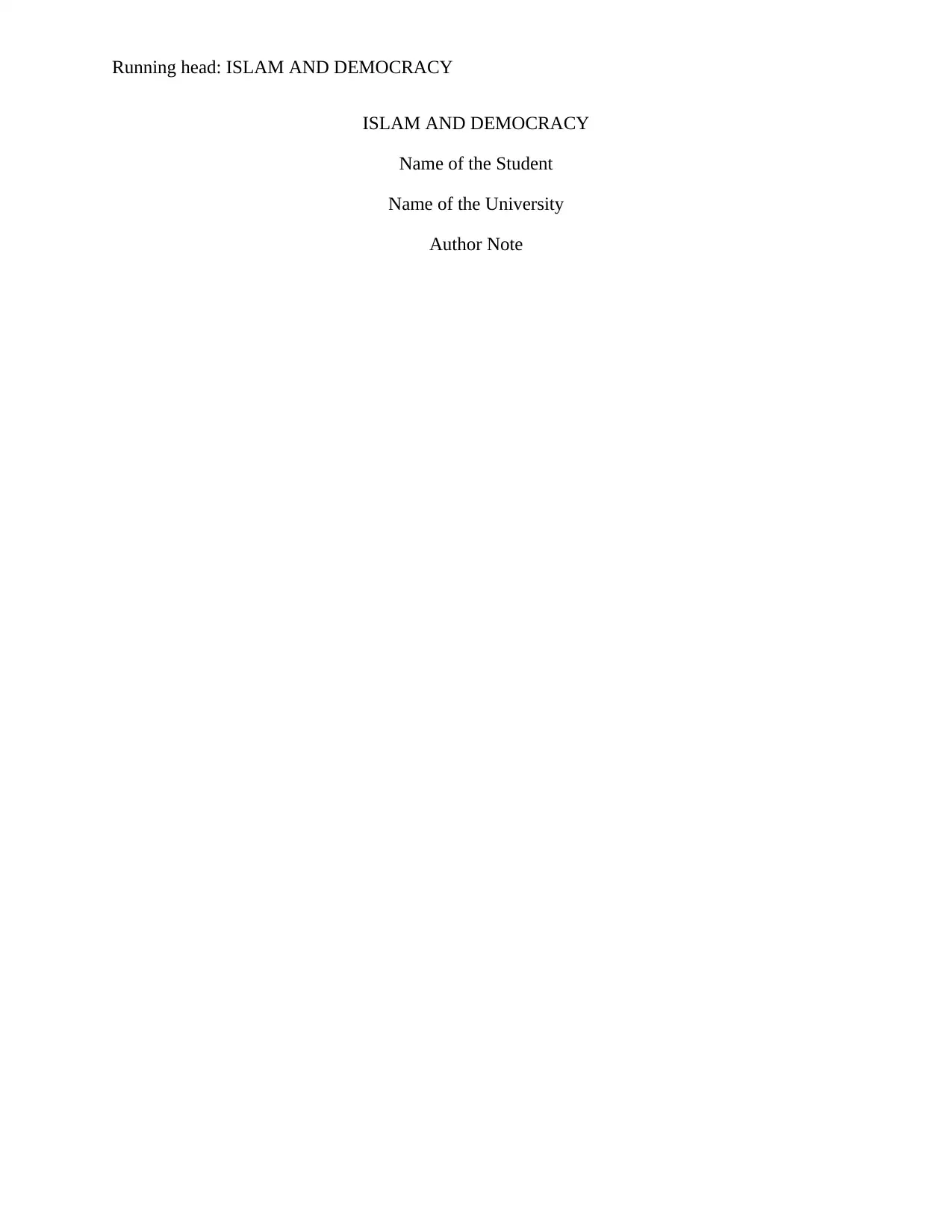
Running head: ISLAM AND DEMOCRACY
ISLAM AND DEMOCRACY
Name of the Student
Name of the University
Author Note
ISLAM AND DEMOCRACY
Name of the Student
Name of the University
Author Note
Paraphrase This Document
Need a fresh take? Get an instant paraphrase of this document with our AI Paraphraser
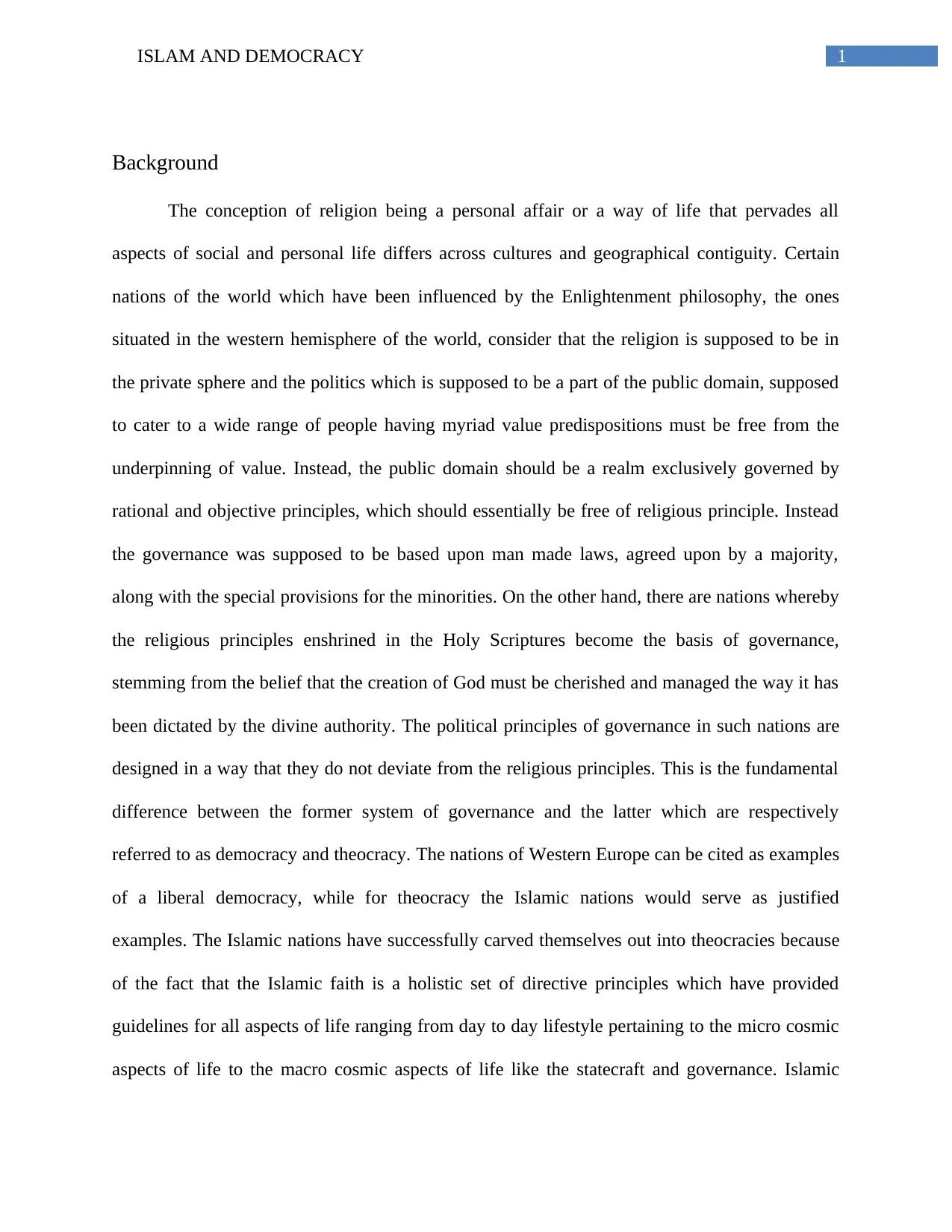
1ISLAM AND DEMOCRACY
Background
The conception of religion being a personal affair or a way of life that pervades all
aspects of social and personal life differs across cultures and geographical contiguity. Certain
nations of the world which have been influenced by the Enlightenment philosophy, the ones
situated in the western hemisphere of the world, consider that the religion is supposed to be in
the private sphere and the politics which is supposed to be a part of the public domain, supposed
to cater to a wide range of people having myriad value predispositions must be free from the
underpinning of value. Instead, the public domain should be a realm exclusively governed by
rational and objective principles, which should essentially be free of religious principle. Instead
the governance was supposed to be based upon man made laws, agreed upon by a majority,
along with the special provisions for the minorities. On the other hand, there are nations whereby
the religious principles enshrined in the Holy Scriptures become the basis of governance,
stemming from the belief that the creation of God must be cherished and managed the way it has
been dictated by the divine authority. The political principles of governance in such nations are
designed in a way that they do not deviate from the religious principles. This is the fundamental
difference between the former system of governance and the latter which are respectively
referred to as democracy and theocracy. The nations of Western Europe can be cited as examples
of a liberal democracy, while for theocracy the Islamic nations would serve as justified
examples. The Islamic nations have successfully carved themselves out into theocracies because
of the fact that the Islamic faith is a holistic set of directive principles which have provided
guidelines for all aspects of life ranging from day to day lifestyle pertaining to the micro cosmic
aspects of life to the macro cosmic aspects of life like the statecraft and governance. Islamic
Background
The conception of religion being a personal affair or a way of life that pervades all
aspects of social and personal life differs across cultures and geographical contiguity. Certain
nations of the world which have been influenced by the Enlightenment philosophy, the ones
situated in the western hemisphere of the world, consider that the religion is supposed to be in
the private sphere and the politics which is supposed to be a part of the public domain, supposed
to cater to a wide range of people having myriad value predispositions must be free from the
underpinning of value. Instead, the public domain should be a realm exclusively governed by
rational and objective principles, which should essentially be free of religious principle. Instead
the governance was supposed to be based upon man made laws, agreed upon by a majority,
along with the special provisions for the minorities. On the other hand, there are nations whereby
the religious principles enshrined in the Holy Scriptures become the basis of governance,
stemming from the belief that the creation of God must be cherished and managed the way it has
been dictated by the divine authority. The political principles of governance in such nations are
designed in a way that they do not deviate from the religious principles. This is the fundamental
difference between the former system of governance and the latter which are respectively
referred to as democracy and theocracy. The nations of Western Europe can be cited as examples
of a liberal democracy, while for theocracy the Islamic nations would serve as justified
examples. The Islamic nations have successfully carved themselves out into theocracies because
of the fact that the Islamic faith is a holistic set of directive principles which have provided
guidelines for all aspects of life ranging from day to day lifestyle pertaining to the micro cosmic
aspects of life to the macro cosmic aspects of life like the statecraft and governance. Islamic
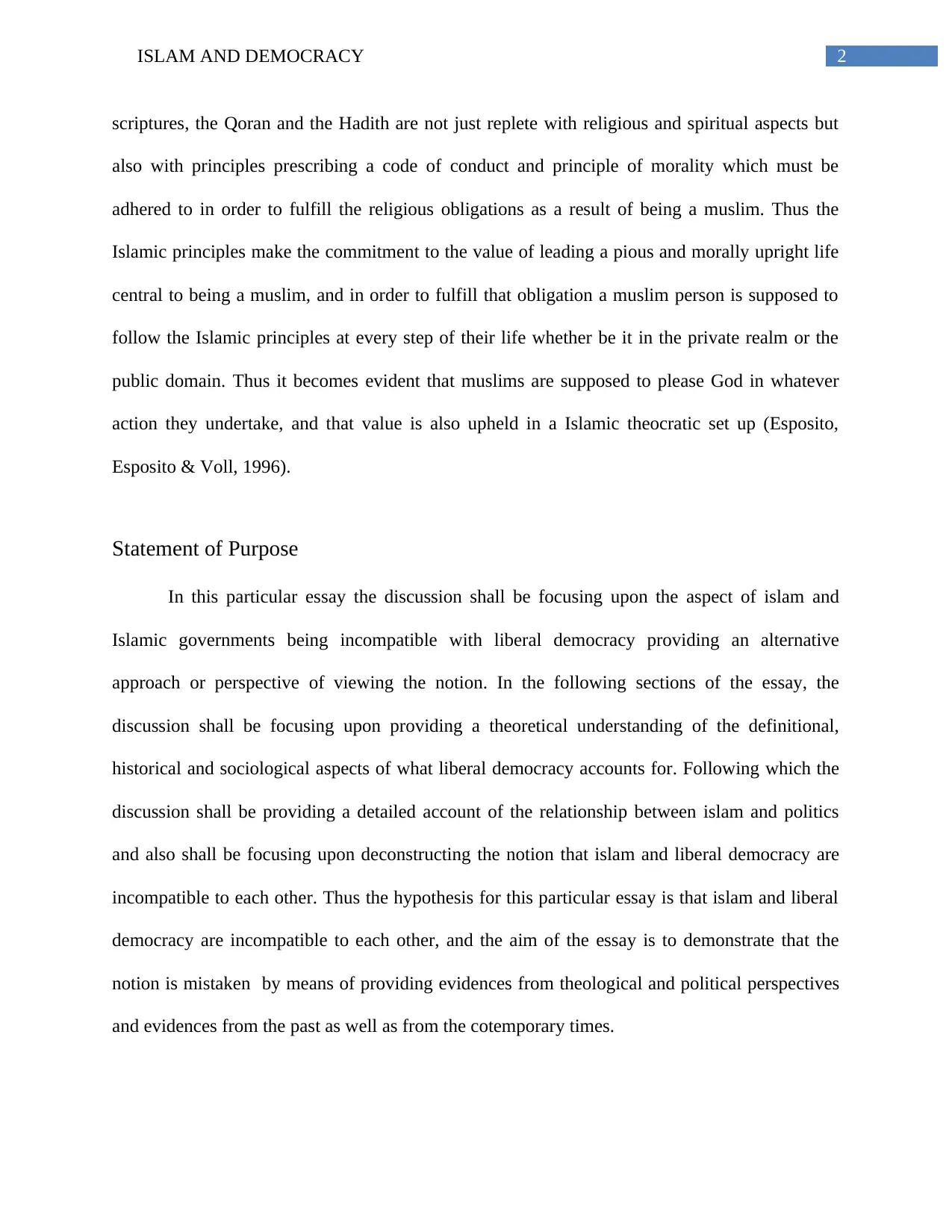
2ISLAM AND DEMOCRACY
scriptures, the Qoran and the Hadith are not just replete with religious and spiritual aspects but
also with principles prescribing a code of conduct and principle of morality which must be
adhered to in order to fulfill the religious obligations as a result of being a muslim. Thus the
Islamic principles make the commitment to the value of leading a pious and morally upright life
central to being a muslim, and in order to fulfill that obligation a muslim person is supposed to
follow the Islamic principles at every step of their life whether be it in the private realm or the
public domain. Thus it becomes evident that muslims are supposed to please God in whatever
action they undertake, and that value is also upheld in a Islamic theocratic set up (Esposito,
Esposito & Voll, 1996).
Statement of Purpose
In this particular essay the discussion shall be focusing upon the aspect of islam and
Islamic governments being incompatible with liberal democracy providing an alternative
approach or perspective of viewing the notion. In the following sections of the essay, the
discussion shall be focusing upon providing a theoretical understanding of the definitional,
historical and sociological aspects of what liberal democracy accounts for. Following which the
discussion shall be providing a detailed account of the relationship between islam and politics
and also shall be focusing upon deconstructing the notion that islam and liberal democracy are
incompatible to each other. Thus the hypothesis for this particular essay is that islam and liberal
democracy are incompatible to each other, and the aim of the essay is to demonstrate that the
notion is mistaken by means of providing evidences from theological and political perspectives
and evidences from the past as well as from the cotemporary times.
scriptures, the Qoran and the Hadith are not just replete with religious and spiritual aspects but
also with principles prescribing a code of conduct and principle of morality which must be
adhered to in order to fulfill the religious obligations as a result of being a muslim. Thus the
Islamic principles make the commitment to the value of leading a pious and morally upright life
central to being a muslim, and in order to fulfill that obligation a muslim person is supposed to
follow the Islamic principles at every step of their life whether be it in the private realm or the
public domain. Thus it becomes evident that muslims are supposed to please God in whatever
action they undertake, and that value is also upheld in a Islamic theocratic set up (Esposito,
Esposito & Voll, 1996).
Statement of Purpose
In this particular essay the discussion shall be focusing upon the aspect of islam and
Islamic governments being incompatible with liberal democracy providing an alternative
approach or perspective of viewing the notion. In the following sections of the essay, the
discussion shall be focusing upon providing a theoretical understanding of the definitional,
historical and sociological aspects of what liberal democracy accounts for. Following which the
discussion shall be providing a detailed account of the relationship between islam and politics
and also shall be focusing upon deconstructing the notion that islam and liberal democracy are
incompatible to each other. Thus the hypothesis for this particular essay is that islam and liberal
democracy are incompatible to each other, and the aim of the essay is to demonstrate that the
notion is mistaken by means of providing evidences from theological and political perspectives
and evidences from the past as well as from the cotemporary times.
⊘ This is a preview!⊘
Do you want full access?
Subscribe today to unlock all pages.

Trusted by 1+ million students worldwide
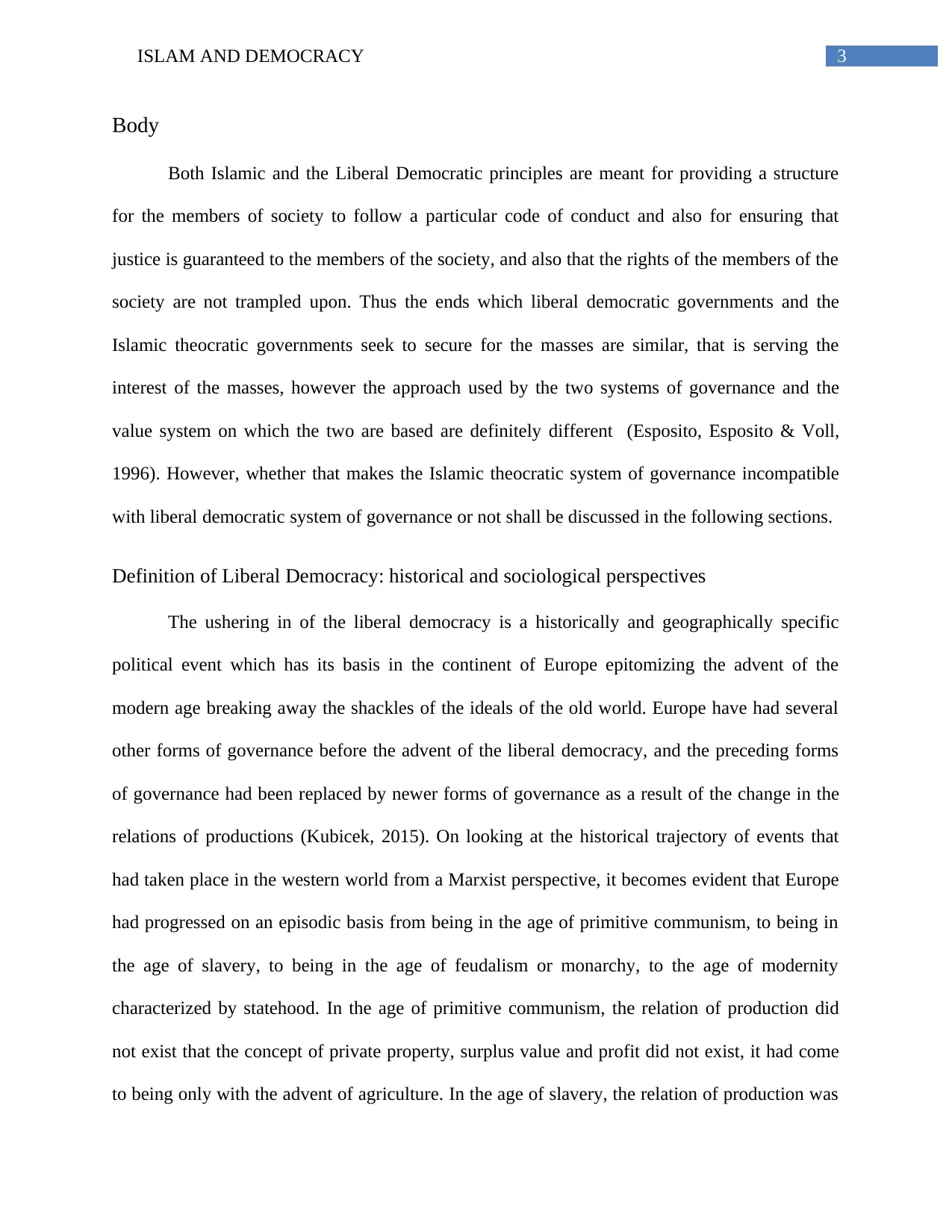
3ISLAM AND DEMOCRACY
Body
Both Islamic and the Liberal Democratic principles are meant for providing a structure
for the members of society to follow a particular code of conduct and also for ensuring that
justice is guaranteed to the members of the society, and also that the rights of the members of the
society are not trampled upon. Thus the ends which liberal democratic governments and the
Islamic theocratic governments seek to secure for the masses are similar, that is serving the
interest of the masses, however the approach used by the two systems of governance and the
value system on which the two are based are definitely different (Esposito, Esposito & Voll,
1996). However, whether that makes the Islamic theocratic system of governance incompatible
with liberal democratic system of governance or not shall be discussed in the following sections.
Definition of Liberal Democracy: historical and sociological perspectives
The ushering in of the liberal democracy is a historically and geographically specific
political event which has its basis in the continent of Europe epitomizing the advent of the
modern age breaking away the shackles of the ideals of the old world. Europe have had several
other forms of governance before the advent of the liberal democracy, and the preceding forms
of governance had been replaced by newer forms of governance as a result of the change in the
relations of productions (Kubicek, 2015). On looking at the historical trajectory of events that
had taken place in the western world from a Marxist perspective, it becomes evident that Europe
had progressed on an episodic basis from being in the age of primitive communism, to being in
the age of slavery, to being in the age of feudalism or monarchy, to the age of modernity
characterized by statehood. In the age of primitive communism, the relation of production did
not exist that the concept of private property, surplus value and profit did not exist, it had come
to being only with the advent of agriculture. In the age of slavery, the relation of production was
Body
Both Islamic and the Liberal Democratic principles are meant for providing a structure
for the members of society to follow a particular code of conduct and also for ensuring that
justice is guaranteed to the members of the society, and also that the rights of the members of the
society are not trampled upon. Thus the ends which liberal democratic governments and the
Islamic theocratic governments seek to secure for the masses are similar, that is serving the
interest of the masses, however the approach used by the two systems of governance and the
value system on which the two are based are definitely different (Esposito, Esposito & Voll,
1996). However, whether that makes the Islamic theocratic system of governance incompatible
with liberal democratic system of governance or not shall be discussed in the following sections.
Definition of Liberal Democracy: historical and sociological perspectives
The ushering in of the liberal democracy is a historically and geographically specific
political event which has its basis in the continent of Europe epitomizing the advent of the
modern age breaking away the shackles of the ideals of the old world. Europe have had several
other forms of governance before the advent of the liberal democracy, and the preceding forms
of governance had been replaced by newer forms of governance as a result of the change in the
relations of productions (Kubicek, 2015). On looking at the historical trajectory of events that
had taken place in the western world from a Marxist perspective, it becomes evident that Europe
had progressed on an episodic basis from being in the age of primitive communism, to being in
the age of slavery, to being in the age of feudalism or monarchy, to the age of modernity
characterized by statehood. In the age of primitive communism, the relation of production did
not exist that the concept of private property, surplus value and profit did not exist, it had come
to being only with the advent of agriculture. In the age of slavery, the relation of production was
Paraphrase This Document
Need a fresh take? Get an instant paraphrase of this document with our AI Paraphraser
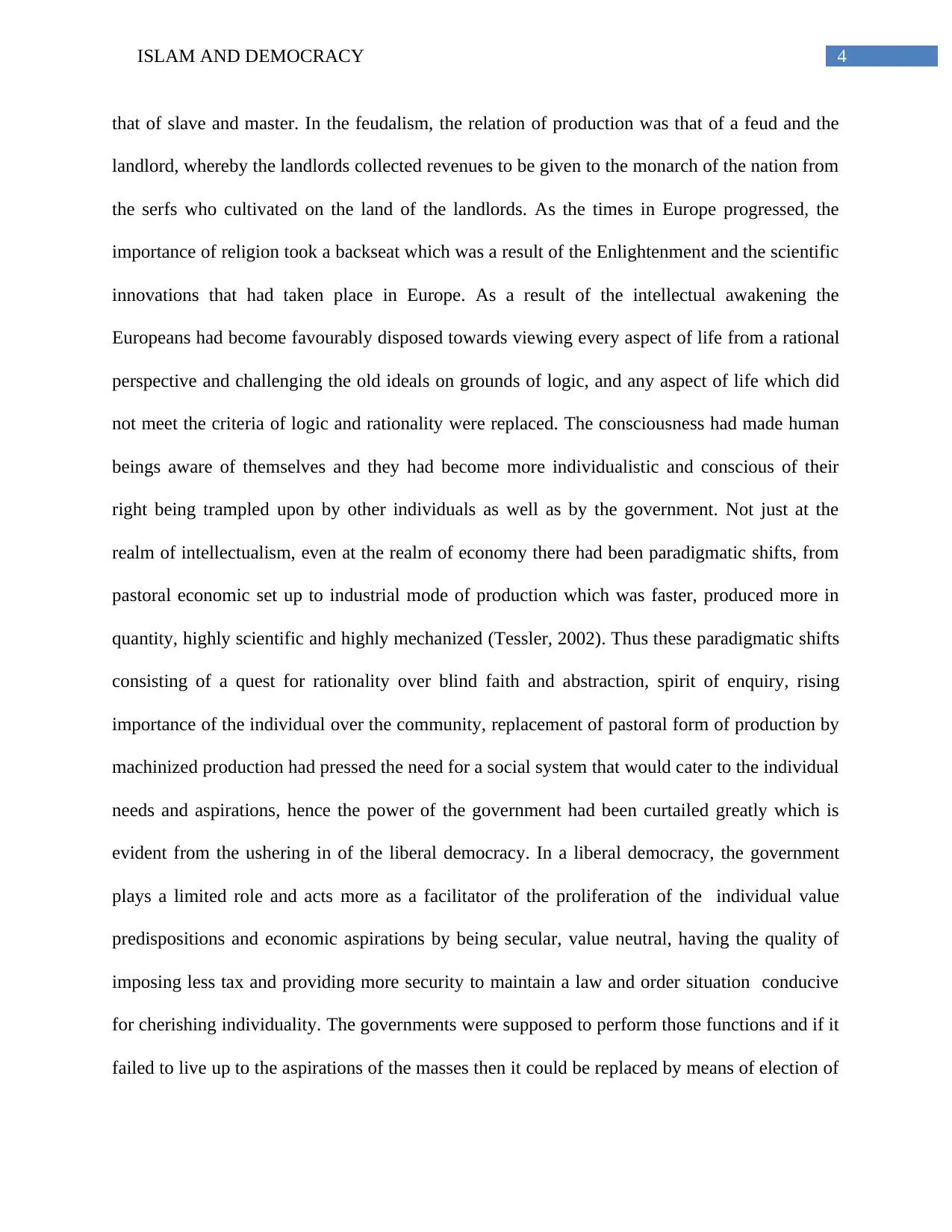
4ISLAM AND DEMOCRACY
that of slave and master. In the feudalism, the relation of production was that of a feud and the
landlord, whereby the landlords collected revenues to be given to the monarch of the nation from
the serfs who cultivated on the land of the landlords. As the times in Europe progressed, the
importance of religion took a backseat which was a result of the Enlightenment and the scientific
innovations that had taken place in Europe. As a result of the intellectual awakening the
Europeans had become favourably disposed towards viewing every aspect of life from a rational
perspective and challenging the old ideals on grounds of logic, and any aspect of life which did
not meet the criteria of logic and rationality were replaced. The consciousness had made human
beings aware of themselves and they had become more individualistic and conscious of their
right being trampled upon by other individuals as well as by the government. Not just at the
realm of intellectualism, even at the realm of economy there had been paradigmatic shifts, from
pastoral economic set up to industrial mode of production which was faster, produced more in
quantity, highly scientific and highly mechanized (Tessler, 2002). Thus these paradigmatic shifts
consisting of a quest for rationality over blind faith and abstraction, spirit of enquiry, rising
importance of the individual over the community, replacement of pastoral form of production by
machinized production had pressed the need for a social system that would cater to the individual
needs and aspirations, hence the power of the government had been curtailed greatly which is
evident from the ushering in of the liberal democracy. In a liberal democracy, the government
plays a limited role and acts more as a facilitator of the proliferation of the individual value
predispositions and economic aspirations by being secular, value neutral, having the quality of
imposing less tax and providing more security to maintain a law and order situation conducive
for cherishing individuality. The governments were supposed to perform those functions and if it
failed to live up to the aspirations of the masses then it could be replaced by means of election of
that of slave and master. In the feudalism, the relation of production was that of a feud and the
landlord, whereby the landlords collected revenues to be given to the monarch of the nation from
the serfs who cultivated on the land of the landlords. As the times in Europe progressed, the
importance of religion took a backseat which was a result of the Enlightenment and the scientific
innovations that had taken place in Europe. As a result of the intellectual awakening the
Europeans had become favourably disposed towards viewing every aspect of life from a rational
perspective and challenging the old ideals on grounds of logic, and any aspect of life which did
not meet the criteria of logic and rationality were replaced. The consciousness had made human
beings aware of themselves and they had become more individualistic and conscious of their
right being trampled upon by other individuals as well as by the government. Not just at the
realm of intellectualism, even at the realm of economy there had been paradigmatic shifts, from
pastoral economic set up to industrial mode of production which was faster, produced more in
quantity, highly scientific and highly mechanized (Tessler, 2002). Thus these paradigmatic shifts
consisting of a quest for rationality over blind faith and abstraction, spirit of enquiry, rising
importance of the individual over the community, replacement of pastoral form of production by
machinized production had pressed the need for a social system that would cater to the individual
needs and aspirations, hence the power of the government had been curtailed greatly which is
evident from the ushering in of the liberal democracy. In a liberal democracy, the government
plays a limited role and acts more as a facilitator of the proliferation of the individual value
predispositions and economic aspirations by being secular, value neutral, having the quality of
imposing less tax and providing more security to maintain a law and order situation conducive
for cherishing individuality. The governments were supposed to perform those functions and if it
failed to live up to the aspirations of the masses then it could be replaced by means of election of
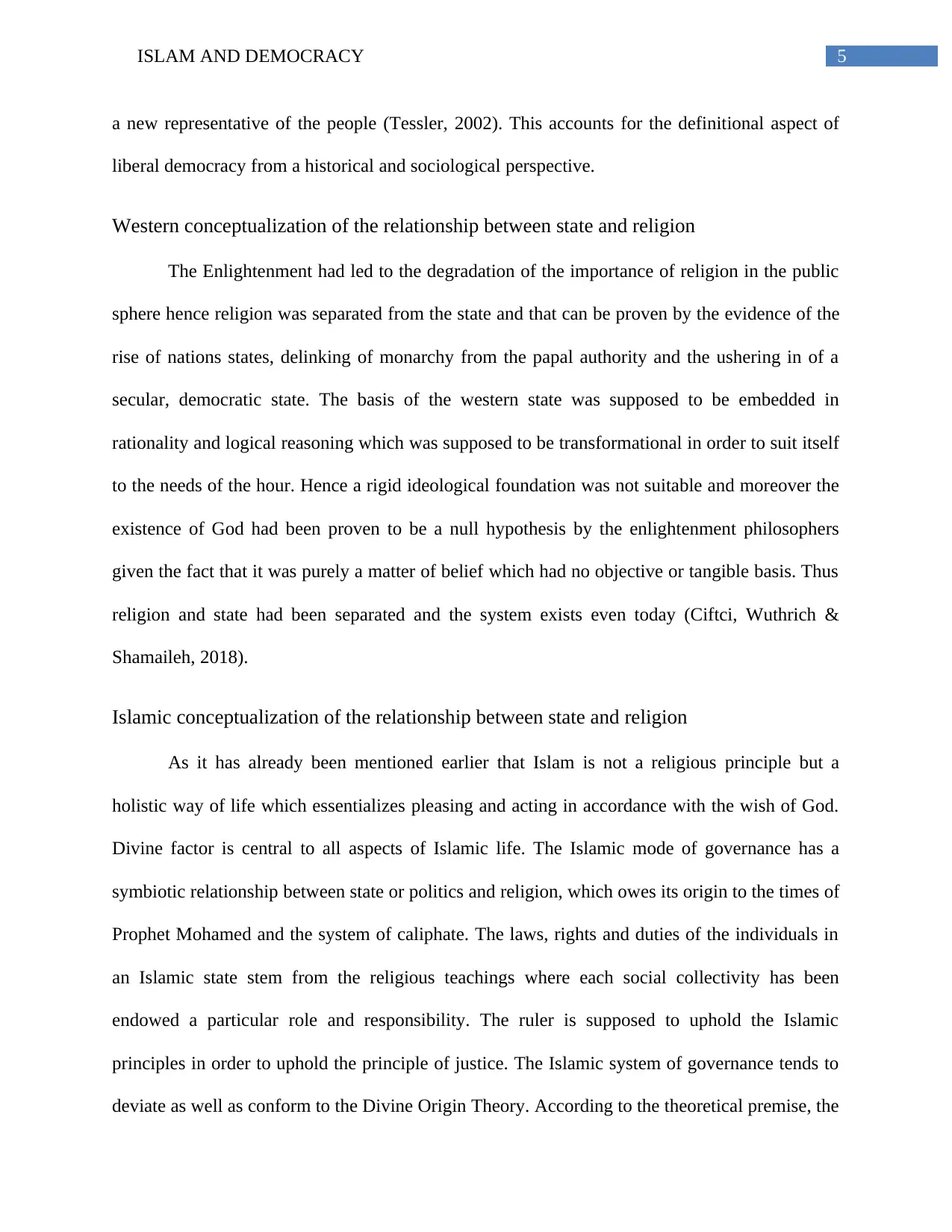
5ISLAM AND DEMOCRACY
a new representative of the people (Tessler, 2002). This accounts for the definitional aspect of
liberal democracy from a historical and sociological perspective.
Western conceptualization of the relationship between state and religion
The Enlightenment had led to the degradation of the importance of religion in the public
sphere hence religion was separated from the state and that can be proven by the evidence of the
rise of nations states, delinking of monarchy from the papal authority and the ushering in of a
secular, democratic state. The basis of the western state was supposed to be embedded in
rationality and logical reasoning which was supposed to be transformational in order to suit itself
to the needs of the hour. Hence a rigid ideological foundation was not suitable and moreover the
existence of God had been proven to be a null hypothesis by the enlightenment philosophers
given the fact that it was purely a matter of belief which had no objective or tangible basis. Thus
religion and state had been separated and the system exists even today (Ciftci, Wuthrich &
Shamaileh, 2018).
Islamic conceptualization of the relationship between state and religion
As it has already been mentioned earlier that Islam is not a religious principle but a
holistic way of life which essentializes pleasing and acting in accordance with the wish of God.
Divine factor is central to all aspects of Islamic life. The Islamic mode of governance has a
symbiotic relationship between state or politics and religion, which owes its origin to the times of
Prophet Mohamed and the system of caliphate. The laws, rights and duties of the individuals in
an Islamic state stem from the religious teachings where each social collectivity has been
endowed a particular role and responsibility. The ruler is supposed to uphold the Islamic
principles in order to uphold the principle of justice. The Islamic system of governance tends to
deviate as well as conform to the Divine Origin Theory. According to the theoretical premise, the
a new representative of the people (Tessler, 2002). This accounts for the definitional aspect of
liberal democracy from a historical and sociological perspective.
Western conceptualization of the relationship between state and religion
The Enlightenment had led to the degradation of the importance of religion in the public
sphere hence religion was separated from the state and that can be proven by the evidence of the
rise of nations states, delinking of monarchy from the papal authority and the ushering in of a
secular, democratic state. The basis of the western state was supposed to be embedded in
rationality and logical reasoning which was supposed to be transformational in order to suit itself
to the needs of the hour. Hence a rigid ideological foundation was not suitable and moreover the
existence of God had been proven to be a null hypothesis by the enlightenment philosophers
given the fact that it was purely a matter of belief which had no objective or tangible basis. Thus
religion and state had been separated and the system exists even today (Ciftci, Wuthrich &
Shamaileh, 2018).
Islamic conceptualization of the relationship between state and religion
As it has already been mentioned earlier that Islam is not a religious principle but a
holistic way of life which essentializes pleasing and acting in accordance with the wish of God.
Divine factor is central to all aspects of Islamic life. The Islamic mode of governance has a
symbiotic relationship between state or politics and religion, which owes its origin to the times of
Prophet Mohamed and the system of caliphate. The laws, rights and duties of the individuals in
an Islamic state stem from the religious teachings where each social collectivity has been
endowed a particular role and responsibility. The ruler is supposed to uphold the Islamic
principles in order to uphold the principle of justice. The Islamic system of governance tends to
deviate as well as conform to the Divine Origin Theory. According to the theoretical premise, the
⊘ This is a preview!⊘
Do you want full access?
Subscribe today to unlock all pages.

Trusted by 1+ million students worldwide
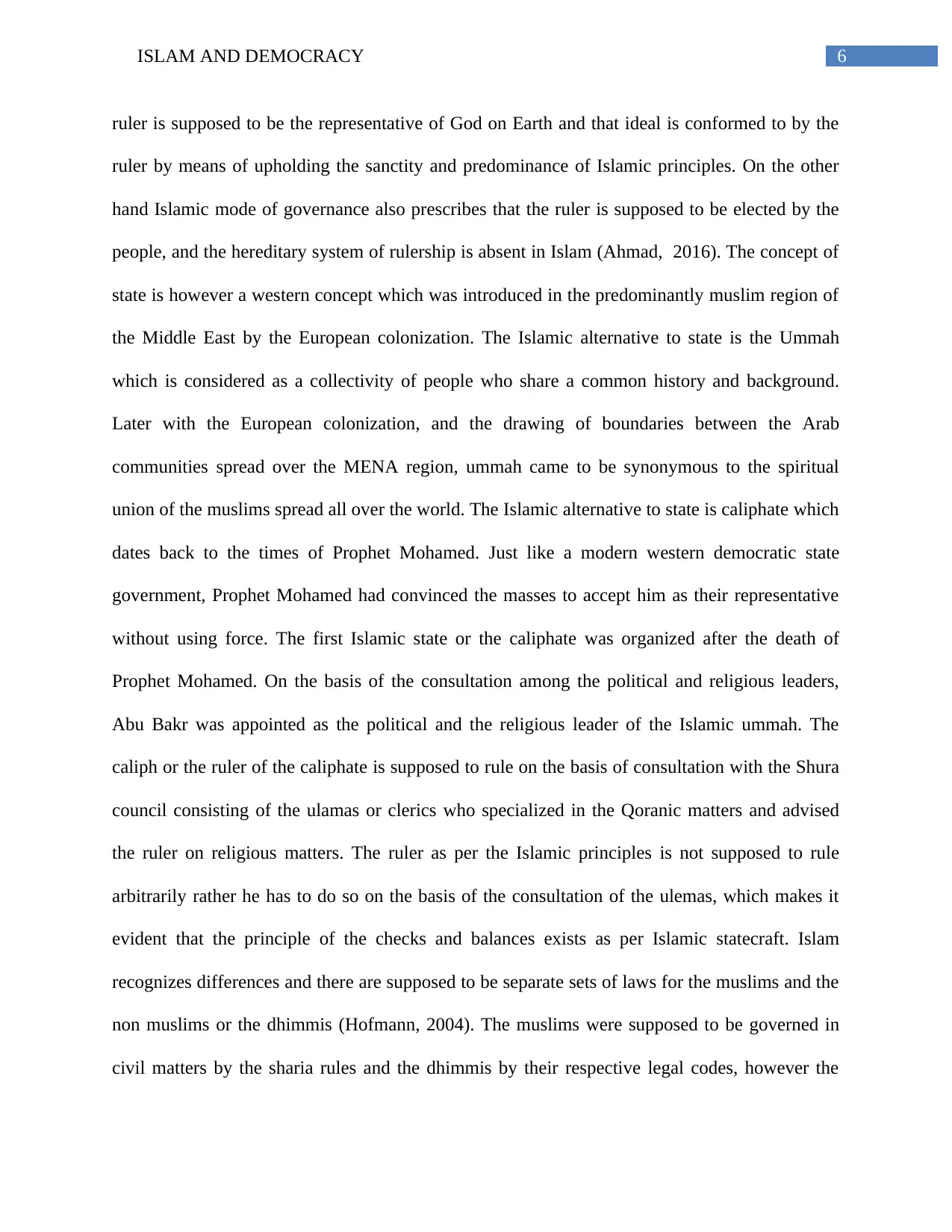
6ISLAM AND DEMOCRACY
ruler is supposed to be the representative of God on Earth and that ideal is conformed to by the
ruler by means of upholding the sanctity and predominance of Islamic principles. On the other
hand Islamic mode of governance also prescribes that the ruler is supposed to be elected by the
people, and the hereditary system of rulership is absent in Islam (Ahmad, 2016). The concept of
state is however a western concept which was introduced in the predominantly muslim region of
the Middle East by the European colonization. The Islamic alternative to state is the Ummah
which is considered as a collectivity of people who share a common history and background.
Later with the European colonization, and the drawing of boundaries between the Arab
communities spread over the MENA region, ummah came to be synonymous to the spiritual
union of the muslims spread all over the world. The Islamic alternative to state is caliphate which
dates back to the times of Prophet Mohamed. Just like a modern western democratic state
government, Prophet Mohamed had convinced the masses to accept him as their representative
without using force. The first Islamic state or the caliphate was organized after the death of
Prophet Mohamed. On the basis of the consultation among the political and religious leaders,
Abu Bakr was appointed as the political and the religious leader of the Islamic ummah. The
caliph or the ruler of the caliphate is supposed to rule on the basis of consultation with the Shura
council consisting of the ulamas or clerics who specialized in the Qoranic matters and advised
the ruler on religious matters. The ruler as per the Islamic principles is not supposed to rule
arbitrarily rather he has to do so on the basis of the consultation of the ulemas, which makes it
evident that the principle of the checks and balances exists as per Islamic statecraft. Islam
recognizes differences and there are supposed to be separate sets of laws for the muslims and the
non muslims or the dhimmis (Hofmann, 2004). The muslims were supposed to be governed in
civil matters by the sharia rules and the dhimmis by their respective legal codes, however the
ruler is supposed to be the representative of God on Earth and that ideal is conformed to by the
ruler by means of upholding the sanctity and predominance of Islamic principles. On the other
hand Islamic mode of governance also prescribes that the ruler is supposed to be elected by the
people, and the hereditary system of rulership is absent in Islam (Ahmad, 2016). The concept of
state is however a western concept which was introduced in the predominantly muslim region of
the Middle East by the European colonization. The Islamic alternative to state is the Ummah
which is considered as a collectivity of people who share a common history and background.
Later with the European colonization, and the drawing of boundaries between the Arab
communities spread over the MENA region, ummah came to be synonymous to the spiritual
union of the muslims spread all over the world. The Islamic alternative to state is caliphate which
dates back to the times of Prophet Mohamed. Just like a modern western democratic state
government, Prophet Mohamed had convinced the masses to accept him as their representative
without using force. The first Islamic state or the caliphate was organized after the death of
Prophet Mohamed. On the basis of the consultation among the political and religious leaders,
Abu Bakr was appointed as the political and the religious leader of the Islamic ummah. The
caliph or the ruler of the caliphate is supposed to rule on the basis of consultation with the Shura
council consisting of the ulamas or clerics who specialized in the Qoranic matters and advised
the ruler on religious matters. The ruler as per the Islamic principles is not supposed to rule
arbitrarily rather he has to do so on the basis of the consultation of the ulemas, which makes it
evident that the principle of the checks and balances exists as per Islamic statecraft. Islam
recognizes differences and there are supposed to be separate sets of laws for the muslims and the
non muslims or the dhimmis (Hofmann, 2004). The muslims were supposed to be governed in
civil matters by the sharia rules and the dhimmis by their respective legal codes, however the
Paraphrase This Document
Need a fresh take? Get an instant paraphrase of this document with our AI Paraphraser
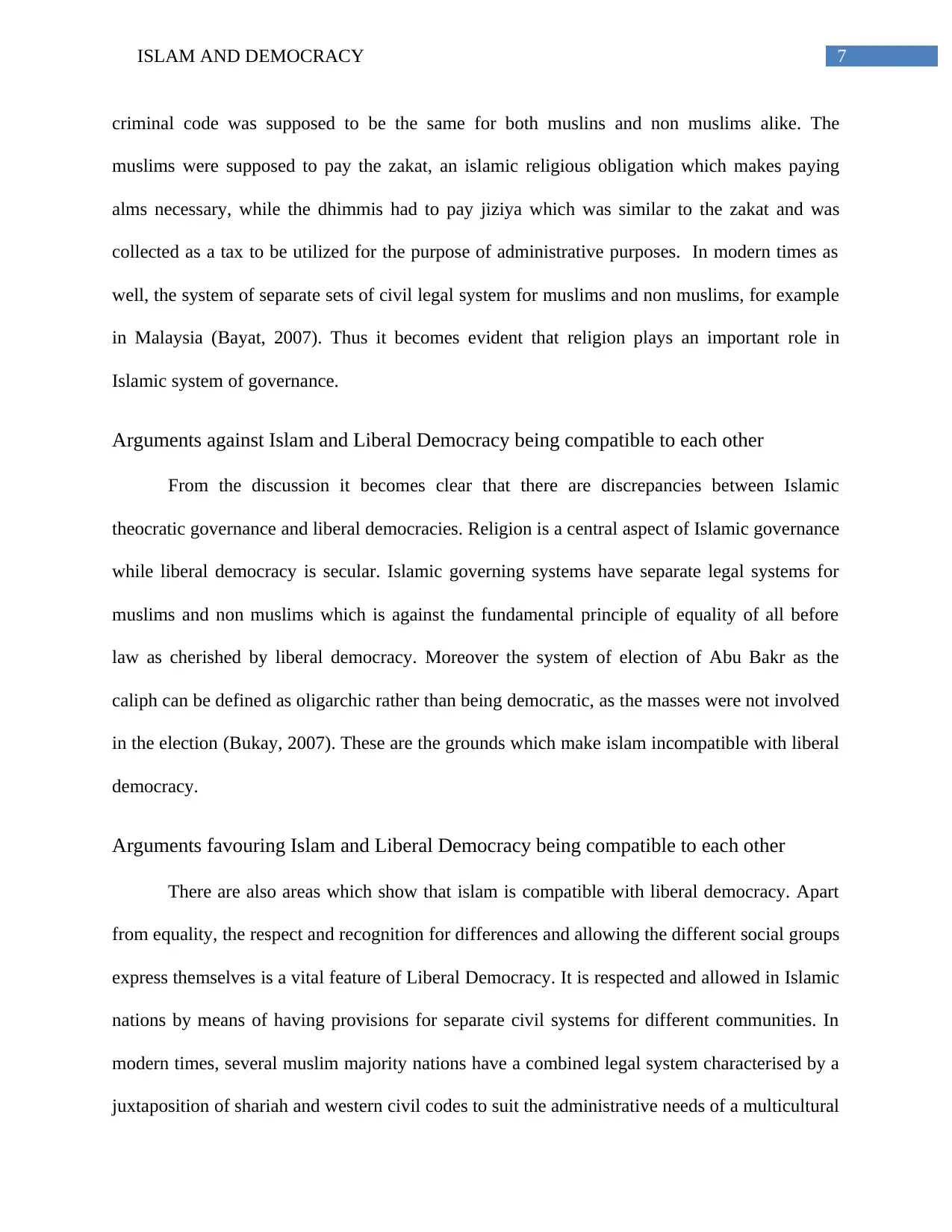
7ISLAM AND DEMOCRACY
criminal code was supposed to be the same for both muslins and non muslims alike. The
muslims were supposed to pay the zakat, an islamic religious obligation which makes paying
alms necessary, while the dhimmis had to pay jiziya which was similar to the zakat and was
collected as a tax to be utilized for the purpose of administrative purposes. In modern times as
well, the system of separate sets of civil legal system for muslims and non muslims, for example
in Malaysia (Bayat, 2007). Thus it becomes evident that religion plays an important role in
Islamic system of governance.
Arguments against Islam and Liberal Democracy being compatible to each other
From the discussion it becomes clear that there are discrepancies between Islamic
theocratic governance and liberal democracies. Religion is a central aspect of Islamic governance
while liberal democracy is secular. Islamic governing systems have separate legal systems for
muslims and non muslims which is against the fundamental principle of equality of all before
law as cherished by liberal democracy. Moreover the system of election of Abu Bakr as the
caliph can be defined as oligarchic rather than being democratic, as the masses were not involved
in the election (Bukay, 2007). These are the grounds which make islam incompatible with liberal
democracy.
Arguments favouring Islam and Liberal Democracy being compatible to each other
There are also areas which show that islam is compatible with liberal democracy. Apart
from equality, the respect and recognition for differences and allowing the different social groups
express themselves is a vital feature of Liberal Democracy. It is respected and allowed in Islamic
nations by means of having provisions for separate civil systems for different communities. In
modern times, several muslim majority nations have a combined legal system characterised by a
juxtaposition of shariah and western civil codes to suit the administrative needs of a multicultural
criminal code was supposed to be the same for both muslins and non muslims alike. The
muslims were supposed to pay the zakat, an islamic religious obligation which makes paying
alms necessary, while the dhimmis had to pay jiziya which was similar to the zakat and was
collected as a tax to be utilized for the purpose of administrative purposes. In modern times as
well, the system of separate sets of civil legal system for muslims and non muslims, for example
in Malaysia (Bayat, 2007). Thus it becomes evident that religion plays an important role in
Islamic system of governance.
Arguments against Islam and Liberal Democracy being compatible to each other
From the discussion it becomes clear that there are discrepancies between Islamic
theocratic governance and liberal democracies. Religion is a central aspect of Islamic governance
while liberal democracy is secular. Islamic governing systems have separate legal systems for
muslims and non muslims which is against the fundamental principle of equality of all before
law as cherished by liberal democracy. Moreover the system of election of Abu Bakr as the
caliph can be defined as oligarchic rather than being democratic, as the masses were not involved
in the election (Bukay, 2007). These are the grounds which make islam incompatible with liberal
democracy.
Arguments favouring Islam and Liberal Democracy being compatible to each other
There are also areas which show that islam is compatible with liberal democracy. Apart
from equality, the respect and recognition for differences and allowing the different social groups
express themselves is a vital feature of Liberal Democracy. It is respected and allowed in Islamic
nations by means of having provisions for separate civil systems for different communities. In
modern times, several muslim majority nations have a combined legal system characterised by a
juxtaposition of shariah and western civil codes to suit the administrative needs of a multicultural
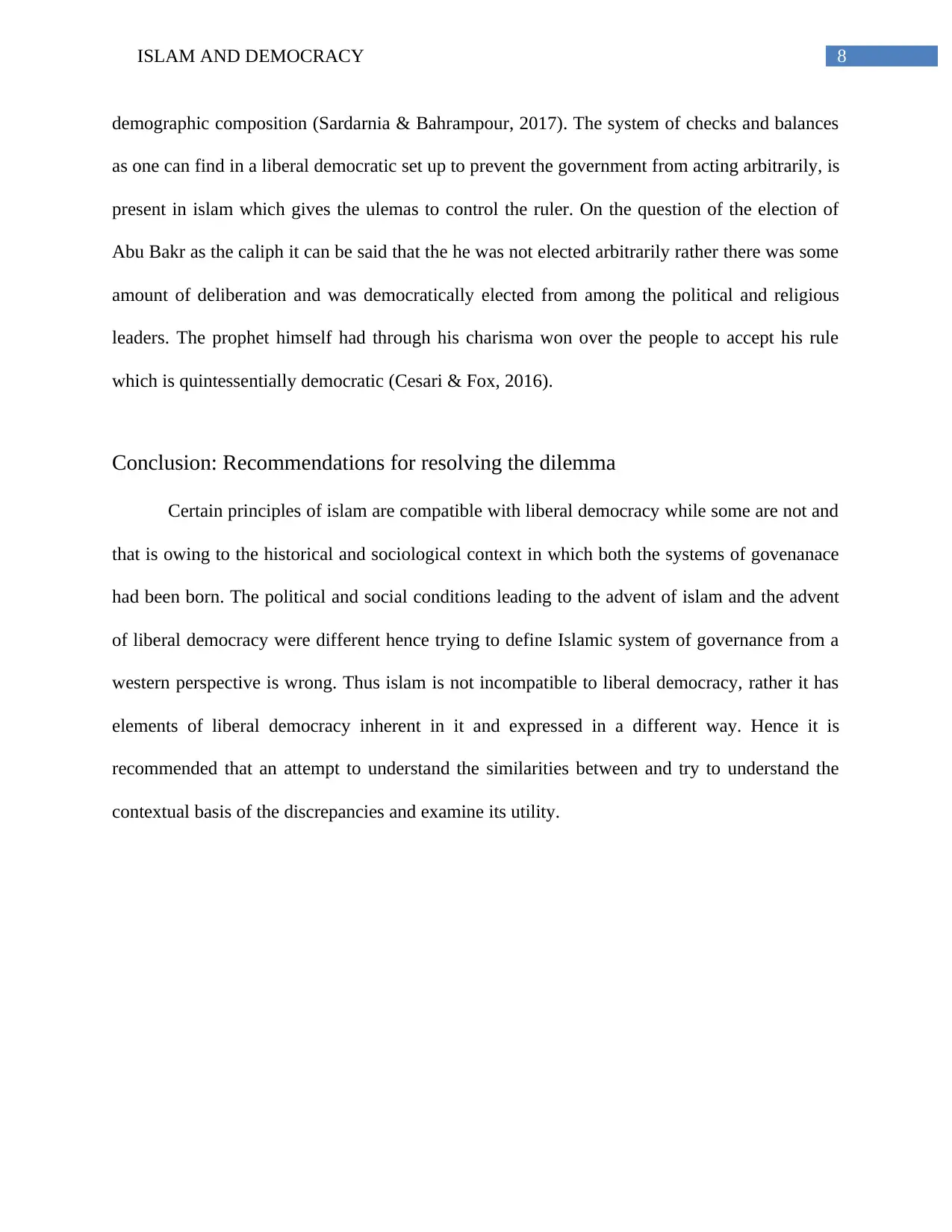
8ISLAM AND DEMOCRACY
demographic composition (Sardarnia & Bahrampour, 2017). The system of checks and balances
as one can find in a liberal democratic set up to prevent the government from acting arbitrarily, is
present in islam which gives the ulemas to control the ruler. On the question of the election of
Abu Bakr as the caliph it can be said that the he was not elected arbitrarily rather there was some
amount of deliberation and was democratically elected from among the political and religious
leaders. The prophet himself had through his charisma won over the people to accept his rule
which is quintessentially democratic (Cesari & Fox, 2016).
Conclusion: Recommendations for resolving the dilemma
Certain principles of islam are compatible with liberal democracy while some are not and
that is owing to the historical and sociological context in which both the systems of govenanace
had been born. The political and social conditions leading to the advent of islam and the advent
of liberal democracy were different hence trying to define Islamic system of governance from a
western perspective is wrong. Thus islam is not incompatible to liberal democracy, rather it has
elements of liberal democracy inherent in it and expressed in a different way. Hence it is
recommended that an attempt to understand the similarities between and try to understand the
contextual basis of the discrepancies and examine its utility.
demographic composition (Sardarnia & Bahrampour, 2017). The system of checks and balances
as one can find in a liberal democratic set up to prevent the government from acting arbitrarily, is
present in islam which gives the ulemas to control the ruler. On the question of the election of
Abu Bakr as the caliph it can be said that the he was not elected arbitrarily rather there was some
amount of deliberation and was democratically elected from among the political and religious
leaders. The prophet himself had through his charisma won over the people to accept his rule
which is quintessentially democratic (Cesari & Fox, 2016).
Conclusion: Recommendations for resolving the dilemma
Certain principles of islam are compatible with liberal democracy while some are not and
that is owing to the historical and sociological context in which both the systems of govenanace
had been born. The political and social conditions leading to the advent of islam and the advent
of liberal democracy were different hence trying to define Islamic system of governance from a
western perspective is wrong. Thus islam is not incompatible to liberal democracy, rather it has
elements of liberal democracy inherent in it and expressed in a different way. Hence it is
recommended that an attempt to understand the similarities between and try to understand the
contextual basis of the discrepancies and examine its utility.
⊘ This is a preview!⊘
Do you want full access?
Subscribe today to unlock all pages.

Trusted by 1+ million students worldwide
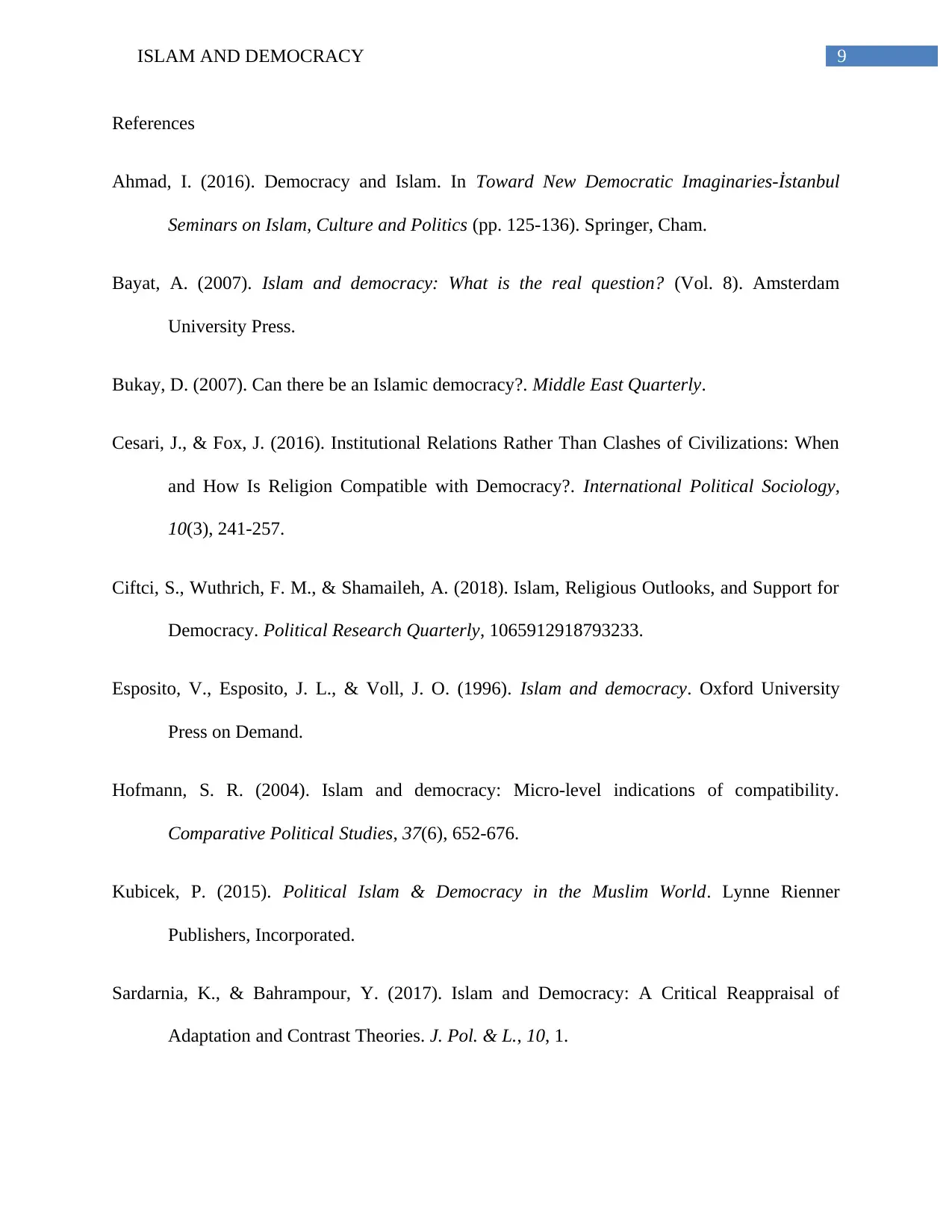
9ISLAM AND DEMOCRACY
References
Ahmad, I. (2016). Democracy and Islam. In Toward New Democratic Imaginaries-İstanbul
Seminars on Islam, Culture and Politics (pp. 125-136). Springer, Cham.
Bayat, A. (2007). Islam and democracy: What is the real question? (Vol. 8). Amsterdam
University Press.
Bukay, D. (2007). Can there be an Islamic democracy?. Middle East Quarterly.
Cesari, J., & Fox, J. (2016). Institutional Relations Rather Than Clashes of Civilizations: When
and How Is Religion Compatible with Democracy?. International Political Sociology,
10(3), 241-257.
Ciftci, S., Wuthrich, F. M., & Shamaileh, A. (2018). Islam, Religious Outlooks, and Support for
Democracy. Political Research Quarterly, 1065912918793233.
Esposito, V., Esposito, J. L., & Voll, J. O. (1996). Islam and democracy. Oxford University
Press on Demand.
Hofmann, S. R. (2004). Islam and democracy: Micro-level indications of compatibility.
Comparative Political Studies, 37(6), 652-676.
Kubicek, P. (2015). Political Islam & Democracy in the Muslim World. Lynne Rienner
Publishers, Incorporated.
Sardarnia, K., & Bahrampour, Y. (2017). Islam and Democracy: A Critical Reappraisal of
Adaptation and Contrast Theories. J. Pol. & L., 10, 1.
References
Ahmad, I. (2016). Democracy and Islam. In Toward New Democratic Imaginaries-İstanbul
Seminars on Islam, Culture and Politics (pp. 125-136). Springer, Cham.
Bayat, A. (2007). Islam and democracy: What is the real question? (Vol. 8). Amsterdam
University Press.
Bukay, D. (2007). Can there be an Islamic democracy?. Middle East Quarterly.
Cesari, J., & Fox, J. (2016). Institutional Relations Rather Than Clashes of Civilizations: When
and How Is Religion Compatible with Democracy?. International Political Sociology,
10(3), 241-257.
Ciftci, S., Wuthrich, F. M., & Shamaileh, A. (2018). Islam, Religious Outlooks, and Support for
Democracy. Political Research Quarterly, 1065912918793233.
Esposito, V., Esposito, J. L., & Voll, J. O. (1996). Islam and democracy. Oxford University
Press on Demand.
Hofmann, S. R. (2004). Islam and democracy: Micro-level indications of compatibility.
Comparative Political Studies, 37(6), 652-676.
Kubicek, P. (2015). Political Islam & Democracy in the Muslim World. Lynne Rienner
Publishers, Incorporated.
Sardarnia, K., & Bahrampour, Y. (2017). Islam and Democracy: A Critical Reappraisal of
Adaptation and Contrast Theories. J. Pol. & L., 10, 1.
Paraphrase This Document
Need a fresh take? Get an instant paraphrase of this document with our AI Paraphraser
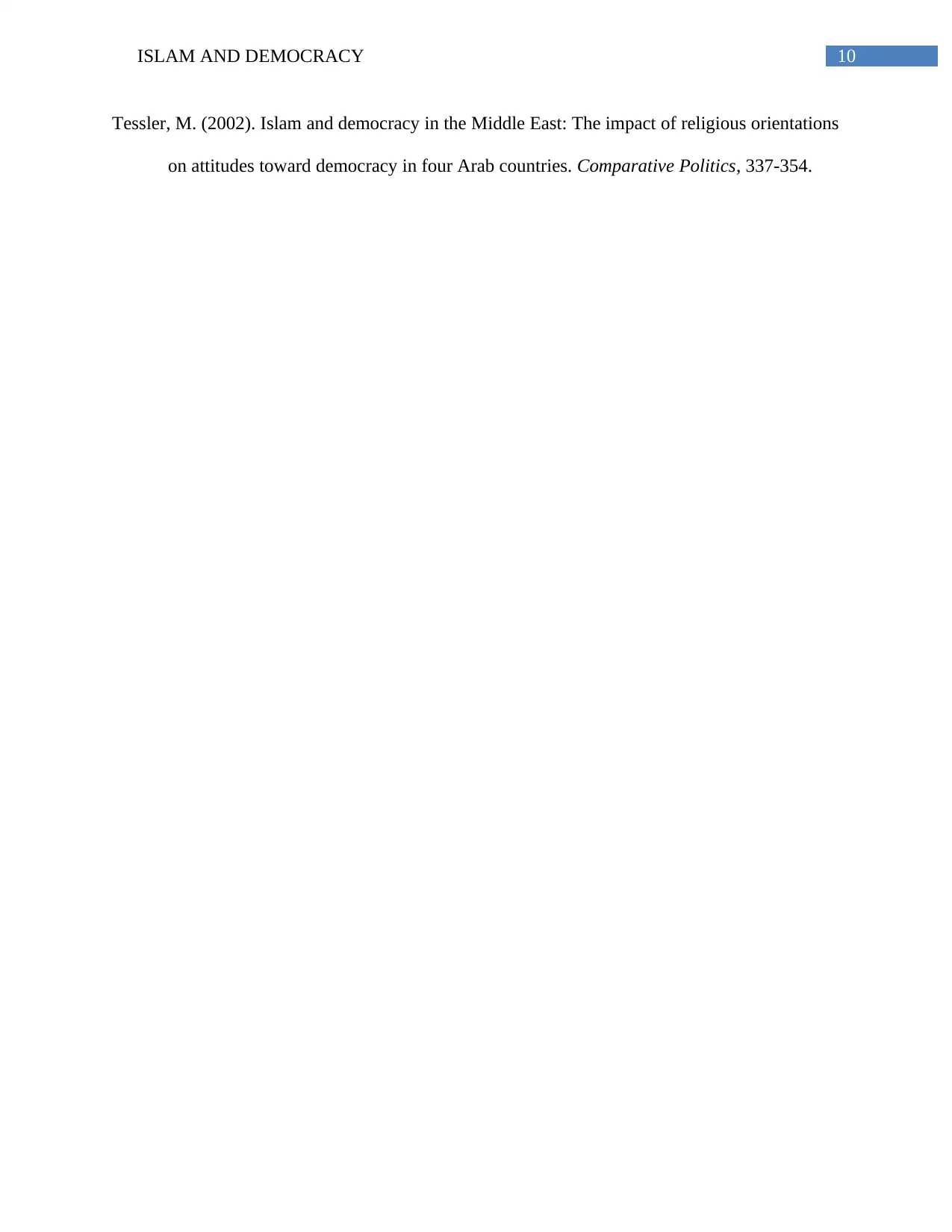
10ISLAM AND DEMOCRACY
Tessler, M. (2002). Islam and democracy in the Middle East: The impact of religious orientations
on attitudes toward democracy in four Arab countries. Comparative Politics, 337-354.
Tessler, M. (2002). Islam and democracy in the Middle East: The impact of religious orientations
on attitudes toward democracy in four Arab countries. Comparative Politics, 337-354.
1 out of 11
Your All-in-One AI-Powered Toolkit for Academic Success.
+13062052269
info@desklib.com
Available 24*7 on WhatsApp / Email
![[object Object]](/_next/static/media/star-bottom.7253800d.svg)
Unlock your academic potential
Copyright © 2020–2025 A2Z Services. All Rights Reserved. Developed and managed by ZUCOL.

